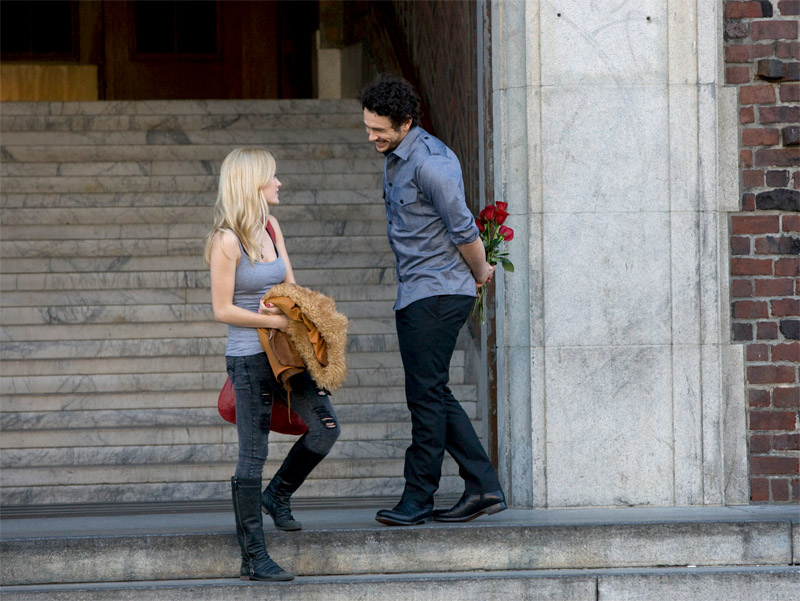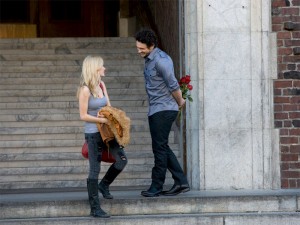Cherry – and interview with director Stephen Elliott on the porn world | Berlin Film Festival 2012

Cherry is a directorial debut of Stephen Elliott – former stripper, author of seven books (including The Adderall Diaries and Happy Baby), founder and editor of the online magazine The Rumpus – co-written together with his friend Lorelei Lee, who is a working porn actress. Onscreen they bring their personal experiences of the porn world, giving a brighter representation to the business and showing that maybe a career in sex is not something to look down on.
The film tells the story of 18-year old beauty Angelina (played by Ashley Hinshaw) drifting into the porn industry and gradually making a successful career. Working at a laundrette and taking care of her alcoholic mother, the girl decides to run off to San Francisco and make something better of her life. She is accompanied by her best friend Andrew (Dev Patel), who is secretly in love with her.
After several jobs Angelina gradually drifts into San Francisco’s warm and welcoming porn industry where, using the moniker Cherry, her naive yet sexy aura soon brings her success. But she also has to deal with difficulties that exist for someone in her line of work: she finds Andrew masturbating to her videos online, her mother pretends to believe she works as a secretary only to lure out some money, and her new boyfriend, cocaine-addict lawyer Frances (James Franco) heavily insults her once he finds out that she sleeps with other men for money.
But is it only for money though? This is a question left ambiguous – it is not entirely clear whether Angelina feels pleasure working, to what extent is the teenager responsible for her decisions, and whether her career benefits her in the ways she expected.
Cherry is a film that is interesting not for what is displayed onscreen (the dialogues can seem trite and shallow at some instances, whereas cinematography by Darren Genet deserves exceptional praise), but for what is left out for our own interpretation. It offers a different point of view devoid of false morality, voyeurism, over-dramatisation and mystification, and instead presents the porn industry as a very natural element of society.
Verdict: •••
After the screening, we asked Stephen Elliott to briefly talk us through his promising debut and ended up discussing specifics of the porn industry
Cherry has just had its worldwide premier here at Berlinale. How does it feel for you to watch the film on a big screen?
It is definitely incredible to watch my film on a big screen, especially on this screen in particular [Friedrichstadt-Palast] which is I’ve heard the biggest screen in Western Europe, so I was certainly overwhelmed. I’m happy about how the film turned out – it is a better movie than I thought it was going to be, it’s better than the script.
I was about to ask how you researched for Cherry, but I heard you are yourself very much involved with the porn industry.
Cherry’s shot in San Francisco’s Armory, which is an actual porn studio – real porn films are shot in the rooms you see in the movie. It’s the largest porn studio in the world. I’ve done work with them, it’s a place I know very intimately, a lot of my friends work there, it’s three blocks away from where I live… you know, it’s my community. I was writing about a world I knew very well. And it is only one slice of the pornography world; kink.com and San Francisco’s porn scene is its own scene, and I am not that familiar with Los Angeles porn scene for example, but this is a particular place and it is definitely a place I know well.
That is probably why Cherry demonstrates such love, sympathy and understanding to porn industry people. But it also shows that they come there from very problematic backgrounds – Angelina was forced into this choice by her dysfunctional family situation. What do you think is the relevance of this?
People arrive to sex work in a lot of different ways. Some people come from bad homes and some people don’t. But I think that a lot of time sex workers are misjudged as “all those people from bad homes”, – but that’s not a statement on sex work, that’s just where they’re from! That doesn’t mean sex work is bad – sex work is not the “bad home”. You can’t blame what a person is doing now on where they came from – sex work was not the abuser. The legitimate question is, is sex work helping or hurting them, or is it not having an effect? Is it just a job? Is sex work the best scenario for these people, or is it dangerous, something harmful? Those are the questions; where they came from is not actually relevant as much as where will they go from here.
And where can they go?
I think that sex work is a job. The biggest problem I have with it is that sometimes people like it a lot and they think it’s a career and it ends up only being a job. It’s hard to move ahead in sex work, hard to get a raise or move into the next stage. Some people – like Angelina in the movie – become porn directors; there are more and more female directors in particular who were actors themselves first. Lorelei [script’s co-writer, porn actress] directed a lot.
So it basically ends with directing?
It can happen this way, yes. But for most people it doesn’t – there’s only a minority, a narrow number of actors who become directors, and there are many more actors than directors. So obviously most of them don’t go anywhere – they just stop doing sex work at some point and start something else. It’s much like bar attending, less like a career – something you wanna do while you’re at school, or if you’re writing a book or something, and you need a job to get by.
But in your film, it’s very doubtful whether sex work for Angelina is only a means to get by.
Of course, because she is a three-dimensional character; there is no one reason why Angelina does sex work. There’s no one reason why we do anything – nobody is that simple. Angelina has a lot of motivations: money is one of them, she might enjoy it, she meets new people, or maybe it’s just the most attractive option for where she is in her life at the time… there are a number of reasons. And to avoid simplifying, you have to bring yourself to the story to decide why these people do this. I would never disclose a person’s motivation in the story! I’ve written seven books and never explained why somebody does something, it’s not like “dad yelled at me and then I became a hooker.” It doesn’t work that way – there’s never one single motivation.
What part of your crew was already familiar with the porn industry?
Most of the actors that appear in porn movies in Cherry are actually porn performers in real life. In the actual crew, there were several people – the camera person, one more person from the camera crew… The editor, he also edits porn. Make-up people in the movie are make-up people for porn movies too. So there’s definitely a lot of overlap.
How much art would you say there is in porn, judging from your personal experience? Cause it’s acting as well, isn’t it?
I don’t have that much experience to really speak of that: I’ve only been in a handful of movies and mainly worked as a stripper. The longest video I ever did was a private video for a dominatrix friend and her client, a wrestling video. I think you have to bring your own definition to what art is – people have different attitudes in what constitutes it, so there is a much bigger discussion behind this.
Francis in the movie is a given-up artist, and there’s also an interesting moment of Angelina flicking through an art magazine and he comes by, and she says it’s not important what she reads – the magazine was only lying around. I found it interesting how she rejects the possibility of being smart and intelligent – she does not even try to achieve anything in those terms and kind of keeps using her body as the only asset, but only because she chose it this way.
Interesting – I do not see it that way. But your interpretation is totally valid.
Maybe you can share yours?
I do not want to set it out in any particular way. When you interact with a movie or a book, your interaction is true – what you bring to the story is the rest of it. Authorial intent is not really important.
I think this is the strength of your film – encouragement to bring oneself to it. I will finish with my last question: what’s a “baker’s dozen”?
It’s thirteen. It’s when you go to a baker and ask for a dozen of donuts, and he throws an extra one in there.
…to see where baker’s dozen comes in – watch the film!
Ruta Buciunaite
Watch the trailer of Cherry here



















Facebook
Twitter
Instagram
YouTube
RSS